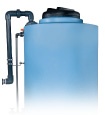When you have questions about chemical storage or concerns about your chemical storage tank system, you want quick answers. You want to know who to call and get a live voice without getting the runaround. A solid customer service team takes great pride in delivering service that saves you time and eliminates any hassles.
Topics:
Value Added
Poly Processing's tanks are manufactured in the United States and are able to accommodate a wide variety of fittings and locations of fittings. This flexibility allows for proper inputs and venting, ensuring a safe and effective solution for a given chemical and longer tank life as well. A common point of confusion that we hear from customers is: Which fittings can I use on my tank, and where can they be installed? We've tried to simplify the answer to that question by considering each area of the tank and the corresponding compatible fittings.
Topics:
Fittings and Accessories
Seismic codes govern structural design to prevent damage to buildings and structures during an earthquake. It’s common knowledge that buildings must conform to specific seismic codes, but your chemical storage tanks also have seismic regulations. Any facility in a seismically active region, including everywhere along the Pacific Rim, must pay careful attention to the safety measures established in the International Building Code.
Chemical leaks present several major challenges for your facility. They can cause damage to storage systems, employees, and the environment. Repair and cleanup costs can be expensive, and the leaked chemical is wasted.
Maintaining the proper temperature of a chemical inside a high density crosslinked polyethylene tank can be critical for safe and effective storage. For example, sodium hydroxide and caustic soda need to maintain temperature to prevent crystallization at lower temperatures.
Topics:
Fittings and Accessories
You’ve heard the adage, “if a job is worth doing, it’s worth doing right.” Poly Processing believes this to be true 110% of the time when it comes to containment. Every single piece of a tank system needs to be completely secure to protect your workspace, your employees, the environment, and the chemical being stored. When you install a tank-within-tank or double wall storage tank system like the SAFE-Tank with a sidewall fitting, it may be important to also install a bellows transition fitting. The bellows fitting lets you safely connect the primary tank with the secondary containment tank.
Topics:
Fittings and Accessories,
FAQs
Poly Processing has three manufacturing plants in the United States. In each facility, we use a multi-step quality control process that meets and/or exceeds industry standards, including ASTM D-1998. The ASTM D-1998 standard is designed to give end users a margin of safety and peace of mind. It’s a voluntary standard, and not all tank manufacturers follow it.
Topics:
Value Added
With over 50 years of experience in creating tanks, fittings, accessories and other materials that ensure your chemical storage solution is safe and tailored to the chemical you are storing, we understand the importance of using the right products for your chemical. We’ve learned how the most popularly stored chemicals, like Sulfuric Acid, Sodium Hypochlorite and Hydrochloric Acid, react to improper storage systems. One part of those tank systems that is crucial is a tank’s gaskets. The tank’s gaskets act as a mechanical seal with a particular fitting to prevent leaks or spills. It is very important to make sure the gaskets and bolts used on your storage tanks are in compliance with what is needed to protect your tank fittings from corrosion caused by reactive chemicals.
Topics:
Fittings and Accessories
Sodium hydroxide, also known as caustic soda or liquid lye, is commonly used to adjust pH levels in water and wastewater and can easily change hard water to a much closer approximation to neutral when injected into the water treatment system. Caustic soda can act as a corrosion inhibitor without the uneven distribution of calcium carbonate. Caustic soda is also used in the manufacturing of chemicals, rayon, cellophane, paper, detergents, soaps, and a variety of other products.
Topics:
Chemicals
Phosphoric acid is one of the top ten chemicals used in the United States. Phosphates have many uses in the treatment of drinking water. Food grade phosphoric acid is common in the food industry, and it’s even used in pharmaceuticals, detergents, and textile pigments.
Topics:
Chemicals



